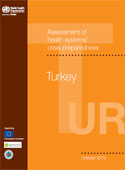Assessment of health systems' crisis preparedness: Turkey

Download
In 2008, with the support of the European Commission Directorate-General for Health and Consumers, WHO launched the project, “Support to health security, preparedness planning and crises management in EU, EU accession and neighbouring (ENP) countries”, with the aim of improving preparedness for public health emergencies in EU Member States and selected EU accession and ENP countries in the WHO European Region. One of the objectives of this project was to refine the assessment tool, which had been revised on the basis of the experience gained through the planning and crises management assessments carried out in Armenia, Azerbaijan and the Republic of Moldova under the joint EC–WHO project, “Support to health security and preparedness planning in EU neighbouring countries” (2007–2008).
Before finalization, the updated tool was applied during a second round of assessments in Kazakhstan, Poland and Ukraine in 2009–2010. The WHO health systems’ framework was used as the conceptual basis for describing and analysing the health systems in the countries. In September–October 2010, a similar assessment using the refined tool was carried out in Turkey. This report evaluates the level of preparedness of the Turkish health system to deal with crises, regardless of cause. It also examines the risk prevention and mitigation initiatives in the country. While the main focus is on the national level, some attention has been paid to crisis management capacity at the regional level and to the links between the various levels of government.



